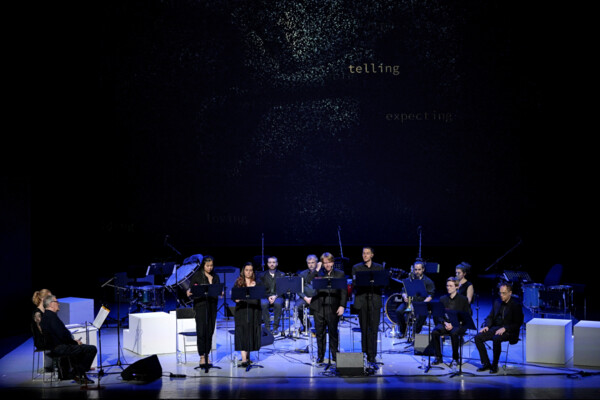As a platform for searching for contemporary forms of the complex genre of music theatre, NODO is the only festival in the Czech Republic with outstanding international overlaps. In 2012, the NODO Biennial was founded by Jiří Nekvasil, the director of the National Moravian-Silesian Theatre, and Petr Kotík, the artistic manager of the Ostrava Center for New Music. Although the festival has the word opera in its title and the composers relate their works to this genre, the sixth edition demonstrated once again that the effort to fit the pieces in the traditional understanding of opera would be too simplifying. There was actually only one performance of an opera in the traditional sense of bringing together the soloists or a choir and an orchestra in a story on the stage: it was Sciarrino’s Superflumina with the reference to Psalm 137. However, it does not contain a classical “story” either. Using elusive snippets of music that shift between silence, rustle, and noises, Sciarrino puts together murmur, shouting, and whispers to create hallucinatory flashes of memories, the Woman’s state of mind, who is desperately lonely despite being in the middle of the crowd at a noisy railway station.
The authors treated the individual parts of gesamtkunstwerk, to use the term associated with Wagner, in quest to dismantle, rearrange, release and change their hierarchy. Lucie Páchová’s Approximate was a sound installation, in which amplified sounds, rustle, murmur, twitter,and breath “emerged” from the loudspeakers placed all around the auditorium. Their sources were created by four girls, including the author, on the stage when they were throwing a ball, undoing the zipper, strumming the wire spokes,and jumping on a trampoline. The playful experiment encouraged the auditory concentration on sounds we ignore in the sound smog we are flooded with. American composer Judith Berkson was looking for the parallels between “partial memories” and “partial tones” we cannot hear, yet they are part of the sound as well as the hidden snippets of memory. British composer James Layton tried to express the feeling of “saudade”, – happiness, and sadness at the same time, a bittersweet memory that was brilliantly interpreted by soprano Markéta Schaffartzik and conductor Bruno Ferrandis.

photo: NODO, Petr Kotík: Many Many Women
The Opálená ski resort in Beskydy saw the “documentary opera” Nulanus by Slovak conductor Miro Tóth. Nulanus was written for a ski slope in summer and four clones of a man, who are unflatteringly depicted by artificial intelligence after the end of the world. The grassy slope with a ski lift had paths and rings we strolled up and down, accompanied by shepherds with sticks with attached loudspeakers. They produced opera singing as well as old man’s breath, a wrinkled staggering man in a white bathrobe, who was gradually cloned four times, and hardly understandable snatches of announcements and information about growing potatoes presented in the hunch of the apocalypse. The trombonists dressed in green were playing from the wood. It was a provocation to give this environmental production a documentary opera label, but also a demonstration of what technological means the theatre has today – those were sci-fi fantasies not a long time ago.
Petr Kotík attacked the limits of the length of production in his vocal and instrumental piece Many Many Women with Gertrude Stein’s quirky text. It lasted for six hours with no intermissions. Three pairs of flute, trumpet, and trombone players and three pairs of singers were weaving the never-endingacoustic structure, where the snippets of melodies played by the pairs in parallel fifths weaved in never-ending jeremiads. Jo Fabian created a videoart screening for the first performance of the piece composed in 1975-78 on the stage in Ostrava: abstract images of cosmic structures, clouds, numbers, and names of ancient scholars emerged and vanished over the rear horizon.
NODO culminated with the Czech premiere of Luigi Nono’s Prometeo or The Tragedy of Hearing. It is a 20th-century magnificent and outstanding piece. Nono’s two-hour acoustic and spatial monument is composed for four orchestras, instrumental soloists, five vocal soloists, a choir, two reciters, and live electronics. Trojhalí Karolina in Ostrava saw the arrangement of one hundred performers on lorry bodies and platforms in a circle, safely conducted by Jiří Rožeň and Petr Kotík. The audiences were in the middle – they were sitting, walking, and lying: they were absolutely immersed in the modern polyphony of sounds and voices wandering to the loudspeakers around the perimeter due to the electronic script.
Text: Helena Havlíková (abridged)
Photo: NODO, Miroslav Tóth: Nulanus

 Learn
Learn







